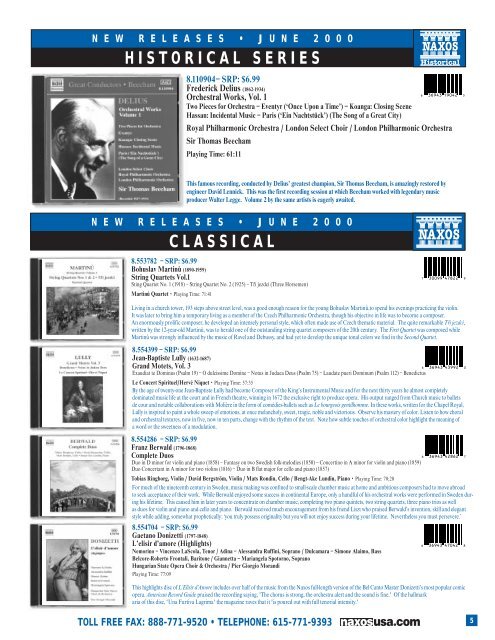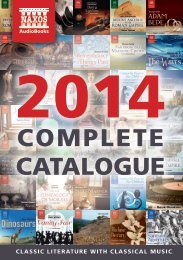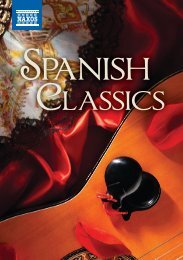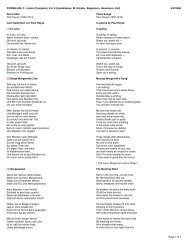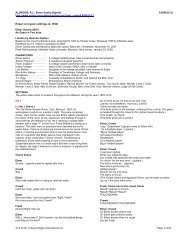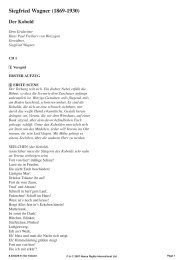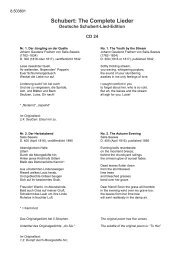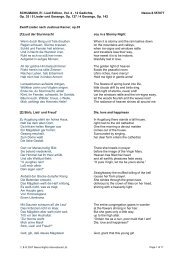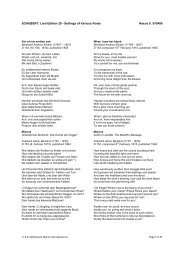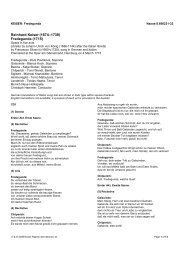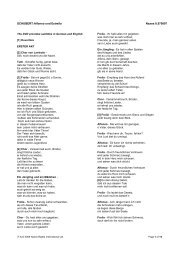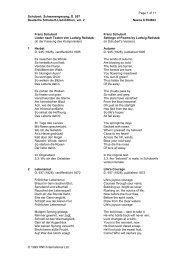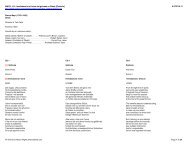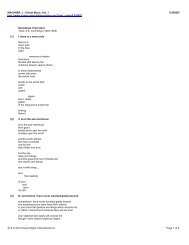Naxos of America to Distribute Ivory Classics.
Naxos of America to Distribute Ivory Classics.
Naxos of America to Distribute Ivory Classics.
Create successful ePaper yourself
Turn your PDF publications into a flip-book with our unique Google optimized e-Paper software.
N E W R E L E A S E S • J U N E 2 0 0 0<br />
HISTORICAL SERIES<br />
N E W R E L E A S E S • J U N E 2 0 0 0<br />
CLASSICAL<br />
8.553782 – SRP: $6.99<br />
Bohuslav Martin˚u (1890-1959)<br />
String Quartets Vol.1<br />
Sting Quartet No. 1 (1918) – String Quartet No. 2 (1925) – Tˇri jezdci (Three Horsemen)<br />
Martin˚u Quartet • Playing Time: 71:41<br />
8.110904– SRP: $6.99<br />
Frederick Delius (1862-1934)<br />
Orchestral Works, Vol. 1<br />
Two Pieces for Orchestra – Eventyr (‘Once Upon a Time’) – Koanga: Closing Scene<br />
Hassan: Incidental Music – Paris (‘Ein Nachtstück’) (The Song <strong>of</strong> a Great City)<br />
Royal Philharmonic Orchestra / London Select Choir / London Philharmonic Orchestra<br />
Sir Thomas Beecham<br />
Playing Time: 61:11<br />
Living in a church <strong>to</strong>wer, 193 steps above street level, was a good enough reason for the young Bohuslav Martin˚u,<strong>to</strong> spend his evenings practicing the violin.<br />
It was later <strong>to</strong> bring him a temporary living as a member <strong>of</strong> the Czech Philharmonic Orchestra, though his objective in life was <strong>to</strong> become a composer.<br />
An enormously prolific composer, he developed an intensely personal style, which <strong>of</strong>ten made use <strong>of</strong> Czech thematic material. The quite remarkable Tˇri jezdci,<br />
written by the 12-year-old Martin˚u, was <strong>to</strong> herald one <strong>of</strong> the outstanding string quartet composers <strong>of</strong> the 20th century. The First Quartet was composed while<br />
Martin˚u was strongly influenced by the music <strong>of</strong> Ravel and Debussy, and had yet <strong>to</strong> develop the unique <strong>to</strong>nal colors we find in the Second Quartet.<br />
8.554399 – SRP: $6.99<br />
Jean-Baptiste Lully (1632-1687)<br />
Grand Motets, Vol. 3<br />
This famous recording, conducted by Delius’ greatest champion, Sir Thomas Beecham, is amazingly res<strong>to</strong>red by<br />
engineer David Lennick. This was the first recording session at which Beecham worked with legendary music<br />
producer Walter Legge. Volume 2 by the same artists is eagerly awaited.<br />
Exaudiat te Dominus (Psalm 19) – O dulcissime Domine – Notus in Judaea Deus (Psalm 75) – Laudate pueri Dominum (Psalm 112) – Benedictus<br />
TOLL FREE FAX: 888-771-9520 • TELEPHONE: 615-771-9393<br />
6 36943 19042 5<br />
7 30099 47822 9<br />
6 36943 43992 0<br />
Le Concert Spirituel/Hervé Niquet • Playing Time: 57:35<br />
By the age <strong>of</strong> twenty-one Jean-Baptiste Lully had become Composer <strong>of</strong> the King’s Instrumental Music and for the next thirty years he almost completely<br />
dominated music life at the court and in French theatre, winning in 1672 the exclusive right <strong>to</strong> produce opera. His output ranged from Church music <strong>to</strong> ballets<br />
de cour and notable collaborations with Molière in the form <strong>of</strong> comédies-ballets such as Le bourgeois gentilhomme. In these works, written for the Chapel Royal,<br />
Lully is inspired <strong>to</strong> paint a whole sweep <strong>of</strong> emotions, at once melancholy, sweet, tragic, noble and vic<strong>to</strong>rious. Observe his mastery <strong>of</strong> color. Listen <strong>to</strong> how choral<br />
and orchestral textures, now in five, now in ten parts, change with the rhythm <strong>of</strong> the text. Note how subtle <strong>to</strong>uches <strong>of</strong> orchestral color highlight the meaning <strong>of</strong><br />
a word or the sweetness <strong>of</strong> a modulation.<br />
8.554286 – SRP: $6.99<br />
Franz Berwald (1796-1868)<br />
Complete Duos<br />
Duo in D minor for violin and piano (1858) – Fantasy on two Swedish folk-melodies (1850) – Concertino in A minor for violin and piano (1859)<br />
Duo Concertant in A minor for two violins (1816) – Duo in B flat major for cello and piano (1857)<br />
6 36943 42862 7<br />
Tobias Ringborg, Violin / David Bergström, Violin / Mats Rondin, Cello / Bengt-Ake Lundin, Piano • Playing Time: 70:20<br />
For much <strong>of</strong> the nineteenth century in Sweden, music making was confined <strong>to</strong> small-scale chamber music at home and ambitious composers had <strong>to</strong> move abroad<br />
<strong>to</strong> seek acceptance <strong>of</strong> their work. While Berwald enjoyed some success in continental Europe, only a handful <strong>of</strong> his orchestral works were performed in Sweden during<br />
his lifetime. This caused him in later years <strong>to</strong> concentrate on chamber music, completing two piano quintets, two string quartets, three piano trios as well<br />
as duos for violin and piano and cello and piano. Berwald received much encouragement from his friend Liszt who praised Berwald’s invention, skill and elegant<br />
style while adding, somewhat prophetically: ‘you truly possess originality but you will not enjoy success during your lifetime. Nevertheless you must persevere.’<br />
8.554704 – SRP: $6.99<br />
Gaetano Donizetti (1797-1848)<br />
L’elisir d’amore (Highlights)<br />
Nemorino – Vincenzo LaScola, Tenor / Adina – Alessandra Ruffini, Soprano / Dulcamara – Simone Alaimo, Bass<br />
Belcore-Rober<strong>to</strong> Frontali, Bari<strong>to</strong>ne / Giannetta – Mariangela Spo<strong>to</strong>rno, Soprano<br />
Hungarian State Opera Choir & Orchestra / Pier Giorgio Morandi<br />
Playing Time: 77:09<br />
6 36943 47042 8<br />
This highlights disc <strong>of</strong> L’Elisir d’Amore includes over half <strong>of</strong> the music from the <strong>Naxos</strong> full-length version <strong>of</strong> the Bel Can<strong>to</strong> Master Donizetti’s most popular comic<br />
opera. <strong>America</strong>n Record Guide praised the recording saying, "The chorus is strong, the orchestra alert and the sound is fine." Of the hallmark<br />
aria <strong>of</strong> this disc, "Una Furtiva Lagrima" the magazine raves that it "is poured out with full tenorial intensity."<br />
5


